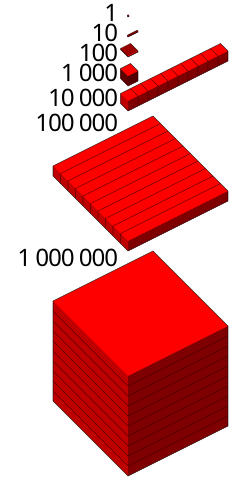| ||||
|---|---|---|---|---|
| Cardinal | one million | |||
| Ordinal | 1000000th (one millionth) | |||
| Factorization | 26 × 56 | |||
| Greek numeral | ||||
| Roman numeral | M | |||
| Binary | 111101000010010000002 | |||
| Ternary | 12122102020013 | |||
| Senary | 332333446 | |||
| Octal | 36411008 | |||
| Duodecimal | 40285412 | |||
| Hexadecimal | F424016 | |||
| Egyptian hieroglyph | 𓁨 | |||
1,000,000 (one million), or one thousand thousand, is the natural number following 999,999 and preceding 1,000,001. The word is derived from the early Italian millione (milione in modern Italian), from mille, "thousand", plus the augmentative suffix -one.[1]
It is commonly abbreviated:
- in British English as m[2][3][4] (not to be confused with the metric prefix "m" milli, for 10−3, or with metre),
- M,[5][6]
- MM ("thousand thousands", from Latin "Mille"; not to be confused with the Roman numeral MM = 2,000),
- mm (not to be confused with millimetre), or
- mn, mln, or mio can be found in financial contexts.[7][8]
In scientific notation, it is written as 1×106 or 106.[9] Physical quantities can also be expressed using the SI prefix mega (M), when dealing with SI units; for example, 1 megawatt (1 MW) equals 1,000,000 watts.
The meaning of the word "million" is common to the short scale and long scale numbering systems, unlike the larger numbers, which have different names in the two systems.
The million is sometimes used in the English language as a metaphor for a very large number, as in "Not in a million years" and "You're one in a million", or a hyperbole, as in "I've walked a million miles" and "You've asked a million-dollar question".
1,000,000 is also the square of 1000 and also the cube of 100.

- ^ "million". Dictionary.com Unabridged. Random House, Inc. Retrieved 4 October 2010.
- ^ "m". Oxford Dictionaries. Oxford University Press. Archived from the original on July 6, 2012. Retrieved 2015-06-30.
- ^ "figures". The Economist Style Guide (11th ed.). The Economist. 2015. ISBN 9781782830917.
- ^ "6.7 Abbreviating 'million' and 'billion'". English Style Guide. A handbook for authors and translators in the European Commission (PDF) (2019 ed.). 26 February 2019. p. 37.
- ^ "m". Merriam-Webster. Merriam-Webster Inc. Retrieved 2015-06-30.
- ^ "Definition of 'M'". Collins English Dictionary. HarperCollins Publishers. Retrieved 2015-06-30.
- ^ Averkamp, Harold. "Q&A: What Does M and MM Stand For?". AccountingCoach.com. AccountingCoach, LLC. Retrieved 25 June 2015.
- ^ "FT makes change to style guide to benefit text-to-speech software". Financial Times. The Financial Times Ltd. 4 February 2022. Retrieved 2024-03-13.
The abbreviation of millions is now 'mn' instead of 'm'. One of the main reasons is to benefit text-to-speech software, which reads out the 'm' as metres instead of millions, confusing visually impaired readers. It also comes into line with our style for billion (bn) and trillion (tn).
- ^ David Wells (1987). The Penguin Dictionary of Curious and Interesting Numbers. London: Penguin Group. p. 185.
1,000,000 = 106
